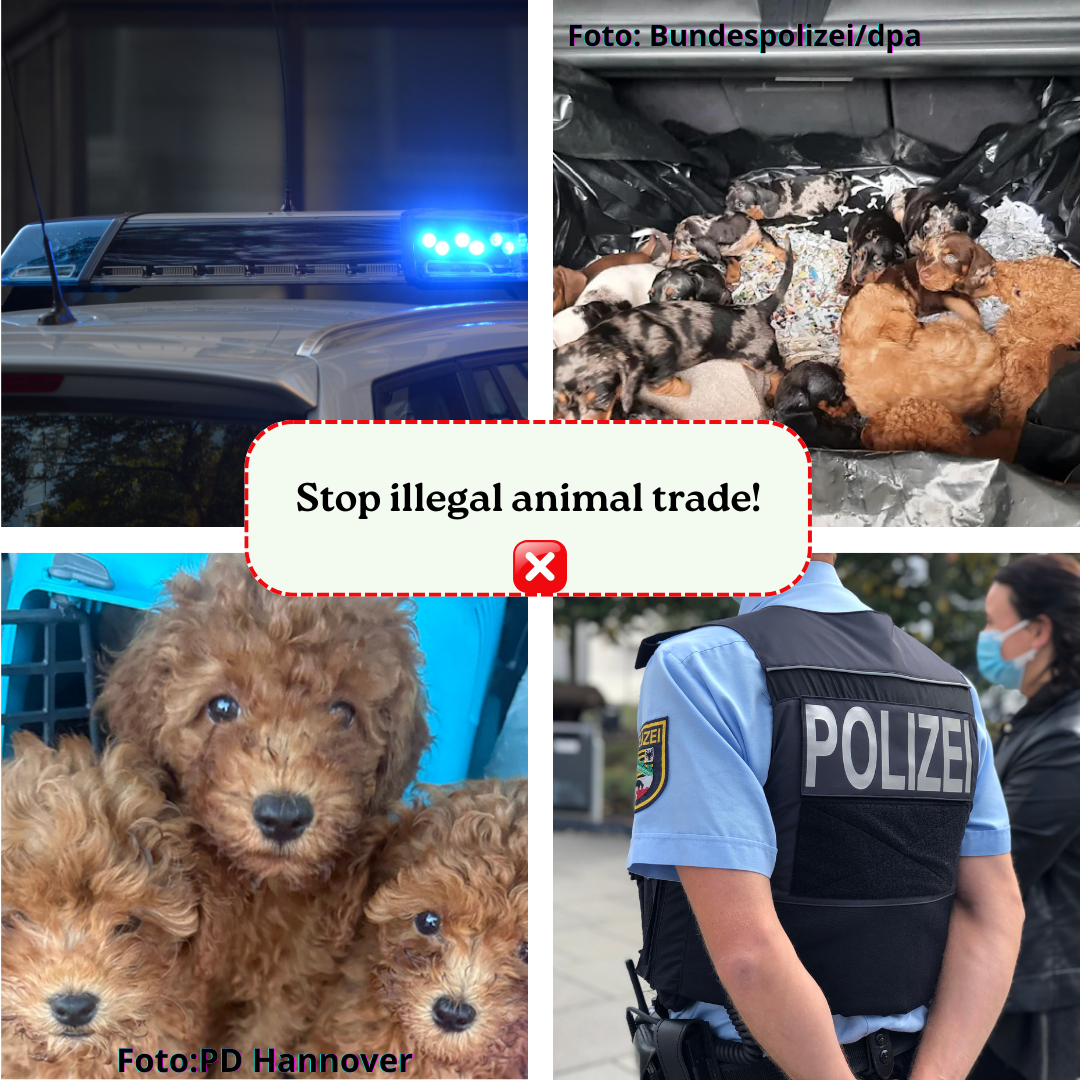In Germany, at the heart of Europe—a country known for its strict animal welfare laws—disturbing news has emerged again. In June 2025 alone, police and veterinary authorities confiscated dozens of puppies transported without papers, food, or water, in conditions that can only be described as cruel.
On June 10th, at the Waidhaus checkpoint on the A6 motorway in Bavaria, police stopped a Mercedes with Hungarian plates. Inside, officers found 20 puppies, including dachshunds and poodle mixes. They were being transported in a trunk lined with plastic sheeting, without proper ventilation, water, or any documentation. Police were alerted by faint whimpers and a sharp smell coming from the car. The 31-year-old Hungarian driver claimed he was heading to Belgium but could not explain the absence of paperwork. The puppies were immediately taken to shelters, where vets diagnosed dehydration. The driver faces criminal charges and was released on a €2,000 bail.
Just a week earlier, on June 2nd, another transporter—a 46-year-old Romanian citizen—was stopped near Passau. The man attempted to flee but was quickly apprehended. Inside his vehicle, police found four tiny puppies, just 3–4 weeks old. No vaccinations, no paperwork, not even a secured box for transport. Clearly, these pups were intended for illegal sale, likely through the internet. They are currently under care at a local shelter, and criminal charges have been filed against the driver.
On June 23rd, again in Germany, and again puppies were involved—this time on the A2 motorway near Hanover. During an international Roadpol operation, police stopped a van with Polish license plates. Inside were nine puppies crammed into three plastic containers—without ventilation, water, or basic conditions for animal transport. It was later discovered the puppies were being transported from Moldova to Dortmund. Veterinary authorities immediately banned further transport after identifying multiple violations.
And these incidents are just the tip of the iceberg. Just one month, just one country, and already several serious violations. These aren't isolated cases—this is a systemic issue. Transporters, sellers, and buyers are all part of a chain in which puppies are merely a way to make money.
For comparison, Austrian customs authorities confiscated 138 animals—110 dogs and 28 cats—in the entirety of 2024. And these are only the detected cases. Most of these animals originated from Eastern Europe, arriving without proper documentation, chips, or vaccinations. Many were sick or too young to travel. They survived only due to the vigilance of mobile inspection teams.
As long as puppies are still found transported like ordinary luggage at European borders, this problem remains unresolved. It cannot be ignored—it demands stricter control and broad, serious public debate.
On June 10th, at the Waidhaus checkpoint on the A6 motorway in Bavaria, police stopped a Mercedes with Hungarian plates. Inside, officers found 20 puppies, including dachshunds and poodle mixes. They were being transported in a trunk lined with plastic sheeting, without proper ventilation, water, or any documentation. Police were alerted by faint whimpers and a sharp smell coming from the car. The 31-year-old Hungarian driver claimed he was heading to Belgium but could not explain the absence of paperwork. The puppies were immediately taken to shelters, where vets diagnosed dehydration. The driver faces criminal charges and was released on a €2,000 bail.
Just a week earlier, on June 2nd, another transporter—a 46-year-old Romanian citizen—was stopped near Passau. The man attempted to flee but was quickly apprehended. Inside his vehicle, police found four tiny puppies, just 3–4 weeks old. No vaccinations, no paperwork, not even a secured box for transport. Clearly, these pups were intended for illegal sale, likely through the internet. They are currently under care at a local shelter, and criminal charges have been filed against the driver.
On June 23rd, again in Germany, and again puppies were involved—this time on the A2 motorway near Hanover. During an international Roadpol operation, police stopped a van with Polish license plates. Inside were nine puppies crammed into three plastic containers—without ventilation, water, or basic conditions for animal transport. It was later discovered the puppies were being transported from Moldova to Dortmund. Veterinary authorities immediately banned further transport after identifying multiple violations.
And these incidents are just the tip of the iceberg. Just one month, just one country, and already several serious violations. These aren't isolated cases—this is a systemic issue. Transporters, sellers, and buyers are all part of a chain in which puppies are merely a way to make money.
For comparison, Austrian customs authorities confiscated 138 animals—110 dogs and 28 cats—in the entirety of 2024. And these are only the detected cases. Most of these animals originated from Eastern Europe, arriving without proper documentation, chips, or vaccinations. Many were sick or too young to travel. They survived only due to the vigilance of mobile inspection teams.
As long as puppies are still found transported like ordinary luggage at European borders, this problem remains unresolved. It cannot be ignored—it demands stricter control and broad, serious public debate.
